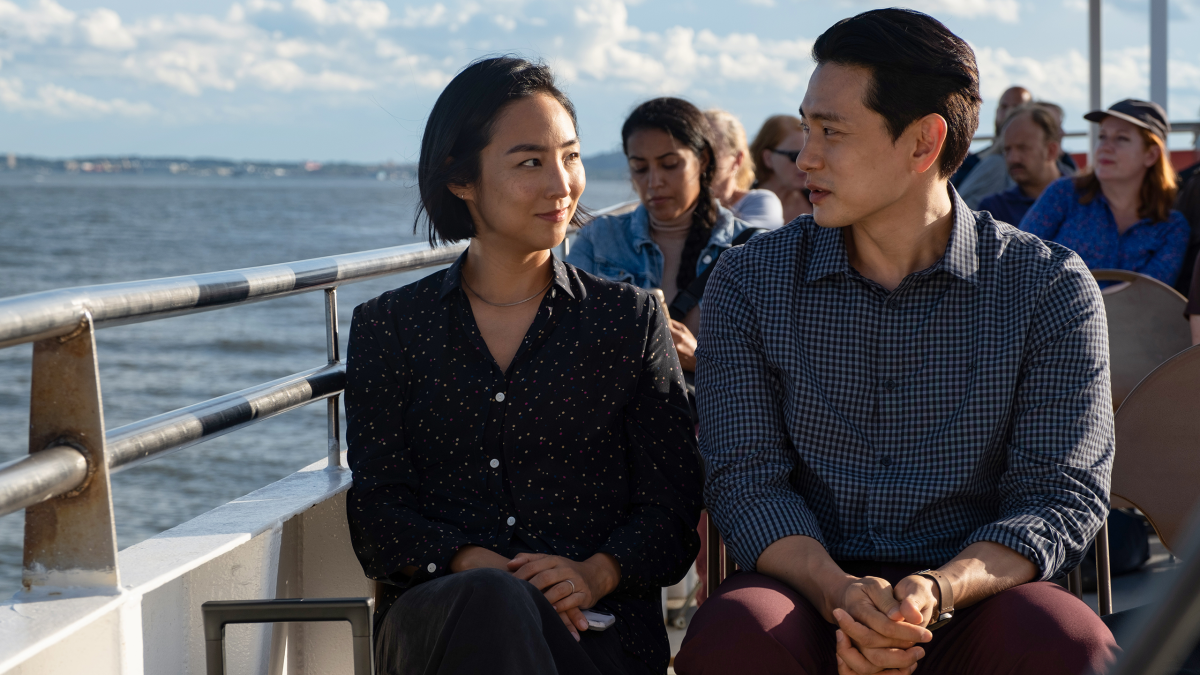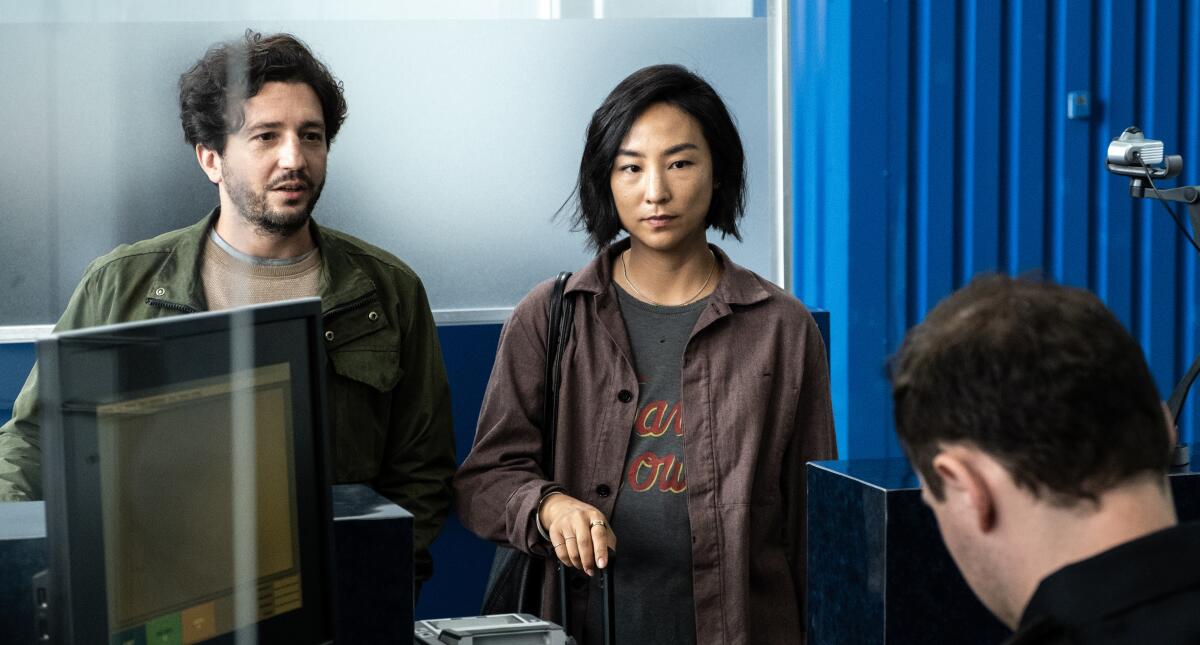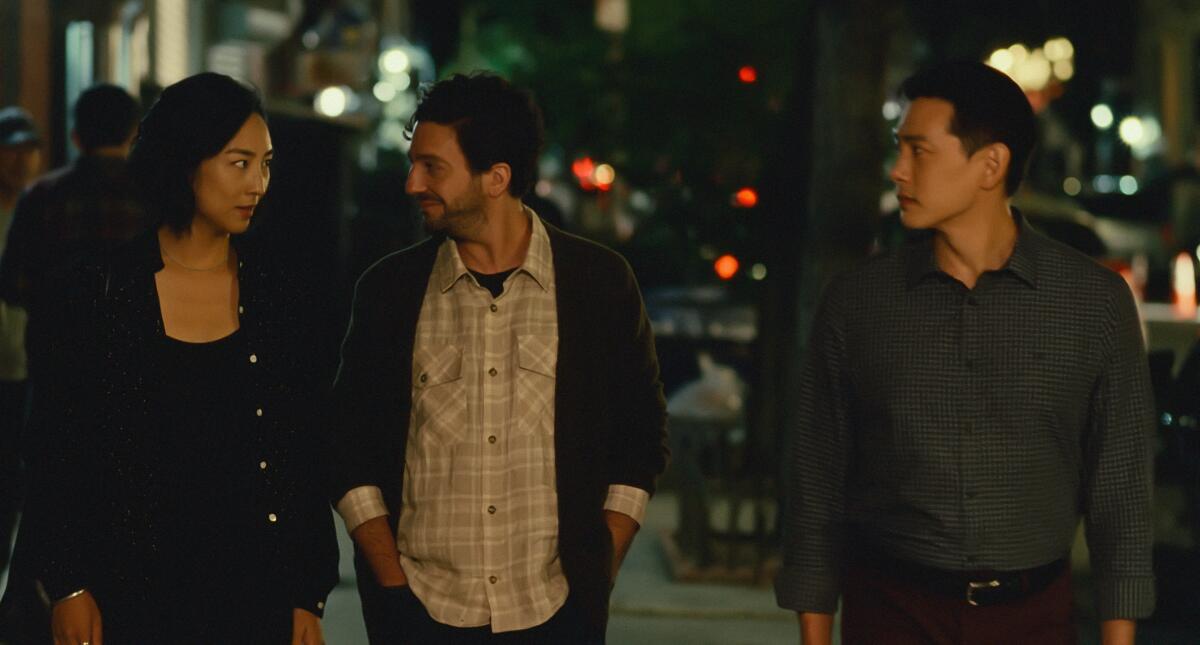Spanning continents and decades, ‘Past Lives’ is a love story for all time

- Share via
“Past Lives,” Celine Song’s gorgeously heady and heartfelt love story, opens with its own wry version of a “three characters walk into a bar” joke. At a warmly lit counter somewhere in New York City, a man and a woman, both of Asian descent, appear lost in conversation while a third man, who’s white, looks quietly on. We can’t hear what they’re saying, though we do hear two off-screen people-watchers — obvious, frankly annoying stand-ins for the audience — musing about how these three might be connected. Are the Asians siblings or significant others? Is the white man one-half of an interracial couple, or is he a tour guide?
Having been on the receiving end of similar questions and assumptions myself (why no, I’m not with the Asian dude standing behind me in line, why do you ask), I fell for “Past Lives” pretty much from the jump. You might, too, even if this playful prologue turns out to be its least typical scene. This achingly romantic and disarmingly thoughtful movie, a critical favorite at the recent Sundance and Berlin film festivals, does not strand us on the outside looking in. It invites us to hang out with its characters in their rooms and workspaces, eavesdrop on their calls and walk alongside them in New York or South Korea, which is where Song’s decades-spanning, continent-hopping fiction properly begins.
It suddenly whooshes us back to 24 years earlier, when the two leads — a girl, Na Young (Seung Ah Moon), and a boy, Hae Sung (Seung Min Yim) — are attending the same school in Seoul. They’re playmates, academic rivals and childhood sweethearts, as signaled by a lovely shot of them riding in the backseat of a car, Na Young sleepily resting her head on Hae Sung’s shoulder. In time Song will summon forth another image, studied but effective, of a fork in the road: Hae Sung walks down a drab-looking street to the left, while Na Young ascends the bright-colored stairs to the right. It’s the last time they’ll see each other for a while: Na Young is moving to Canada with her parents and younger sister, and before long her Korean childhood and her time with Hae Sung will have receded into memory.
That past life is one explanation for the movie’s title, although Song, a playwright making a beguilingly assured feature writing-directing debut, has a gift for tossing off fresh ideas and new meanings on the fly. And I do mean on the fly: “Past Lives,” folding two decades into less than two hours, is as swift and fleet as it is emotionally and philosophically expansive. Soon 12 years have passed (whoosh), and Na Young, once a shy girl with thick braids and a few words of English under her belt, is now Nora, an MFA candidate and aspiring playwright living in Toronto. (Played by “Russian Doll’s” remarkable Greta Lee, Nora is also a stand-in for Song, who drew this story from her personal experience.)

By skipping over Nora’s teenage and early adult years, Song elides a lot of details and short-circuits a lot of potential immigrant-experience clichés. Beyond an occasional phone chat with her mom (Ji Hye Yoon), Nora’s family is seldom in the picture; they’re part of her life, but they don’t define it. And apart from a later scene in which she acknowledges a not-uncommon sense of East-West cultural bifurcation, that identity confusion never becomes an obvious source of drama in itself. Refreshingly, Song doesn’t turn Nora into a mouthpiece for anyone’s experience but the character’s own. She also doesn’t pretend that her narrative approach, isolating three key time frames spaced a dozen years apart, can open more than a partial window into human experience.
All the movie can give us, really, is the same thing memory affords us: a handful of piercing, shimmering moments. When Nora and Hae Sung (Teo Yoo) reconnect by chance on Facebook — she casually searches for him, only to find that he’s been searching for her — a lot of those long-buried moments come surging back. Soon they’re spending hours on Skype, catching up and giving Nora’s rusty Korean a workout. (The elegant trans-Pacific cross-cutting is by editor Keith Fraase.) We learn about Hae Sung’s mandated military service, his engineering studies and his plans to learn Mandarin, his living situation with his parents and his general sense of inertia. We see, too, how closely bound he and Nora are even after 12 years apart, as their reminiscences about the past soon give way to musings about their future.
It’s Nora, realizing that she’s getting distracted from her life in Toronto, who puts that future on hold, asking a disappointed Hae Sung if they can take a break. And life being life, soon another 12 years have whooshed past, bringing the story into roughly the present day. By now, Nora is living in New York City with her husband of seven years, Arthur (John Magaro) — a marriage of green-card convenience that has, with an inevitability the movie scarcely needs to explain, become a union of love. By the time Hae Sung gets in touch and tells Nora he’s coming to New York for a visit, you can see the pieces of that barroom prologue being moved into position.

You can also glimpse the contours of a romantic triangle, albeit one that resists every temptation toward melodramatic confrontation as it finally brings Nora and Hae Sung face-to-face. It’s not that Song isn’t interested in, say, her characters’ physical attraction to each other; it’s that she sees that attraction as inextricable from their emotional history, their cultural overlap and philosophical compatibility. For Nora, Hae Sung is at once a soulfully handsome face, a loving friend, a piercing reminder and maybe the one man on the planet who can begin to see her in her totality. And it’s in their reunion that “Past Lives,” without breaking its casual, conversational register, becomes something quite extraordinary.
New York plays its part: Nora and Hae Sung’s wanderings around the city — a stroll through Brooklyn Bridge Park one day, a ferry ride around the Statue of Liberty the next — offer up a succession of wistfully beautiful, effortlessly resonant images. (Shooting on 35-millimeter film, cinematographer Shabier Kirchner, who did such vibrant work on “Small Axe” and “Skate Kitchen,” works wonders with observational long shots and intimate close-ups alike.) With its mix of soul-searching and sightseeing, “Past Lives” at times suggests a condensed version of Richard Linklater’s temporally and geographically sprawling “Before … ” trilogy. At other moments, this study in lost time and constrained desire steals a glance in the direction of Wong Kar-wai. (I’m tempted to go further still and say that, as a meditation on Asian diasporic destinies, parallel realities and paths not taken, “Past Lives” suggests a quieter but more reverberant companion volume to “Everything Everywhere All at Once.”)
But Song’s voice is more than the sum of these possible inspirations and points of comparison. Crucially, Nora and Hae Sung’s conversations continually circle the Buddhist-derived concept of inyun, which suggests that every encounter between two individuals, however significant, is one thread in fate’s intricately patterned tapestry: the culmination of countless interactions or near-interactions over their past lives. And so the artificial symmetry of the story’s three-part, 24-year structure imposes a near-cosmic significance. Does this movie mark the culmination of a millennia-in-the-making love story? Or is it just the latest step toward some future, endlessly postponable consummation?

The two lead performances hold this difficult question in a kind of exquisite balance, even as they anchor Song’s lofty conceits in a sturdy art-house naturalism. Lee, with her sharply planed and expressive features, capable of shifting from wonderment to skepticism in a heartbeat, suggests the learned assurance of someone very comfortable with change. Yoo’s performance, by contrast, is a pure, guileless distillation of longing. It’s telling that Nora, despite or perhaps because of the freedom she experiences as an artist, may be the greater pragmatist of the two, while it’s Hae Sung, self-identifying as an “ordinary,” traditional specimen of Korean manhood, who makes the movie’s boldest romantic gesture.
And where does all this leave Arthur? A lesser movie would have reduced him to a complication or, worse, a comic-relief cuckold, and the waves of laughter I heard at the movie’s Sundance premiere sounded, in some ways, like a response to that lesser movie. But Magaro, one of the finest actors now working in American independent cinema (“First Cow,” “Showing Up”), sidesteps those possibilities with perhaps the movie’s subtlest, trickiest turn. In his kindly gaze and gentle hands, Arthur, who initially comes across as a bad-boy literary posturer, is both bemused bystander and acutely sensitive soul. No less bound by inyun than Nora or Hae Sung, he responds to an impossibly awkward situation with decency and grace.
And it’s this grace that swirls like a ghost through “Past Lives,” enfolding all three central characters and investing their stories, or what little we see of those stories, with a rare and harmonious balance. This is at once the loftiest and the most grounded love story I’ve seen in some time, a movie that feels lingering and contemplative in the moment but is over as quickly (too quickly) as a drink with a long-absent friend. I won’t give away the lovely, optimistic final image (whoosh!), especially since “Past Lives” knows the very idea of endings is suspect. You leave this movie grateful to have lived alongside these characters to this point, and wondering about the infinite possibilities that lie ahead.
‘Past Lives’
In Korean and English dialogue
Rating: PG-13, for some strong language
Running time: 1 hour, 46 minutes
Playing: Starts June 2 at AMC the Grove 14, Los Angeles; AMC Century City 15
More to Read
Only good movies
Get the Indie Focus newsletter, Mark Olsen's weekly guide to the world of cinema.
You may occasionally receive promotional content from the Los Angeles Times.











